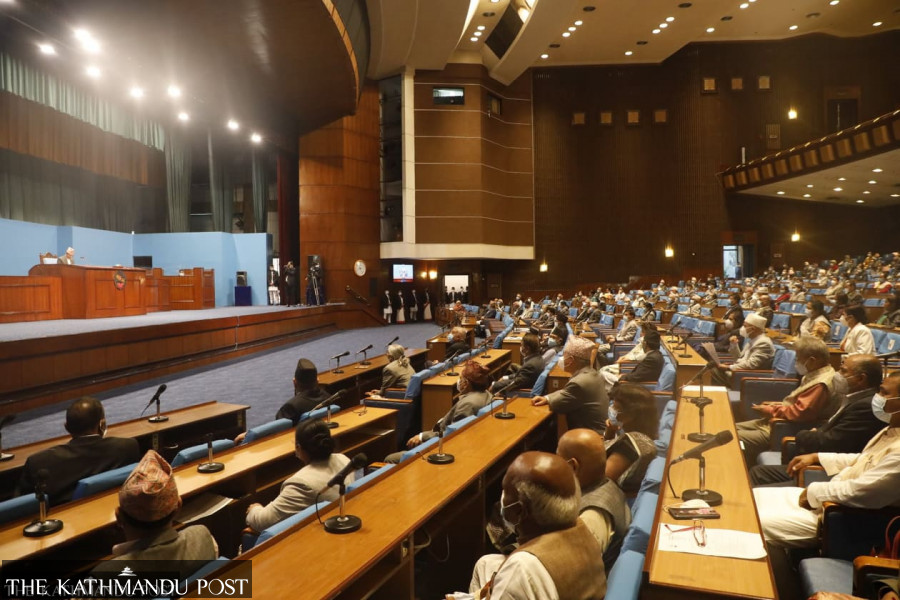National
MCC ratification uncertain as ruling alliance struggles to make a position
Since MCC has become an issue of public concern, there should be a consensus, Speaker Sapkota says.
Binod Ghimire
After three weeks of homework, a taskforce of the ruling alliance finalised the government’s common minimum programme last week. It was unveiled on Monday after an agreement of the cross-party top leadership.
The document, which according to cross-party leaders, guides the functioning of the government has 11 points with multiple sub-points under each of them.
It has pointed out short- and long-term actions to be taken by the incumbent Sher Bahadur Deuba government. The lengthy programme, however, mentions nothing about the Millennium Challenge Corporation’s Nepal Compact, generally called the MCC. The compact, under which Nepal is supposed to receive a $500 million grant from the United States, has been awaiting parliamentary ratification. A bill related to it has been pending at the House of Representatives for over two years.
The common minimum programme failed to accommodate the MCC because there was no unanimity on the issue among the constituents of the ruling alliance.
“We have said all the decisions regarding the foreign policy will be taken on the basis of national consensus. The compact also falls under foreign policy,” Rajendra Shrestha, a Janata Samajbadi Party leader and a member of the task force, told the Post. “The parties in the ruling alliance don’t have a common position on it.”
While the Nepali Congress wants the compact to be endorsed, the CPN (Maoist Centre) has stood against its parliamentary ratification in its present form. It wants a revision in the compact document before the endorsement.
CPN-UML chair and former prime minister KP Sharma Oli on Tuesday made a scathing attack on the ruling alliance and the Deuba government asking about their position on the MCC.
“You have 165 votes. What does this strong group of parliamentarians say?” Oli questioned while addressing the House, referring to Deuba’s 165 votes that he won on July 18 during his vote of confidence. “Are you going to ratify or reject the MCC... or remain silent?”
The Nepal government signed an agreement on the compact with the US government when Deuba was prime minister in 2017.
Then joint-secretary Baikuntha Aryal and Jonathan Nash, acting chief executive officer of the MCC, in September 2017 signed the agreement in the presence of then minister for finance Gyanendra Bahadur Karki and US Deputy Secretary of State John J Sullivan in Washington. The US government agreed to provide $500 million in grants while Nepal would put in $130 million for the project that prioritises energy and roadways. This is the largest grant Nepal is to receive.
Karki, who witnessed the signing, is now a minister for law, justice and parliamentary affairs in the Deuba government, with the responsibility to liaison between the government and parliament.
He is also a member of the business advisory committee of the Parliament which determines businesses for the House. However, without the consent from the Maoist Centre, the business of tabling the MCC in the House for voting is not possible.
At Wednesday's meeting of the National Assembly, Ram Narayan Bidari, who was nominated to the House under the Maoist Centre quota, said the constitution doesn’t allow the compact to be tabled in the House.
“Oli has wrongly been accusing the Speaker of not moving the MCC compact for endorsement,” said Bidari. “Let me make it clear, it is not the subject (issue) to be tabled and decided by the House as per our constitution.”
The Maoist Centre and some leaders from the UML have been arguing that as the MCC is a part of the US government’s Indo-Pacific Strategy it cannot be ratified by Parliament. They have also been claiming that there are several strings attached with the compact which are against national interests.
The US Embassy in Nepal has been saying the grant under the MCC is purely for the development of the projects of Nepal’s priority and there are no hidden interests behind it.
The grant under the MCC will be used for the construction of a 400KV transmission line and upgrading the major highways of the country.
Speaker Agni Sapkota also has hinted that the compact will not be endorsed anytime soon.
Speaking with journalists on Wednesday, Sapkota said he wants a national consensus on the issue before it is tabled for endorsement.
“MCC has become an issue of public concern. Therefore, there should be a consensus on the issue,” he said. “Though the Speaker has a final say in deciding the agenda for the House, I expect a common position, at least among the constituents of the ruling alliance, on the issue.”




 10.12°C Kathmandu
10.12°C Kathmandu














